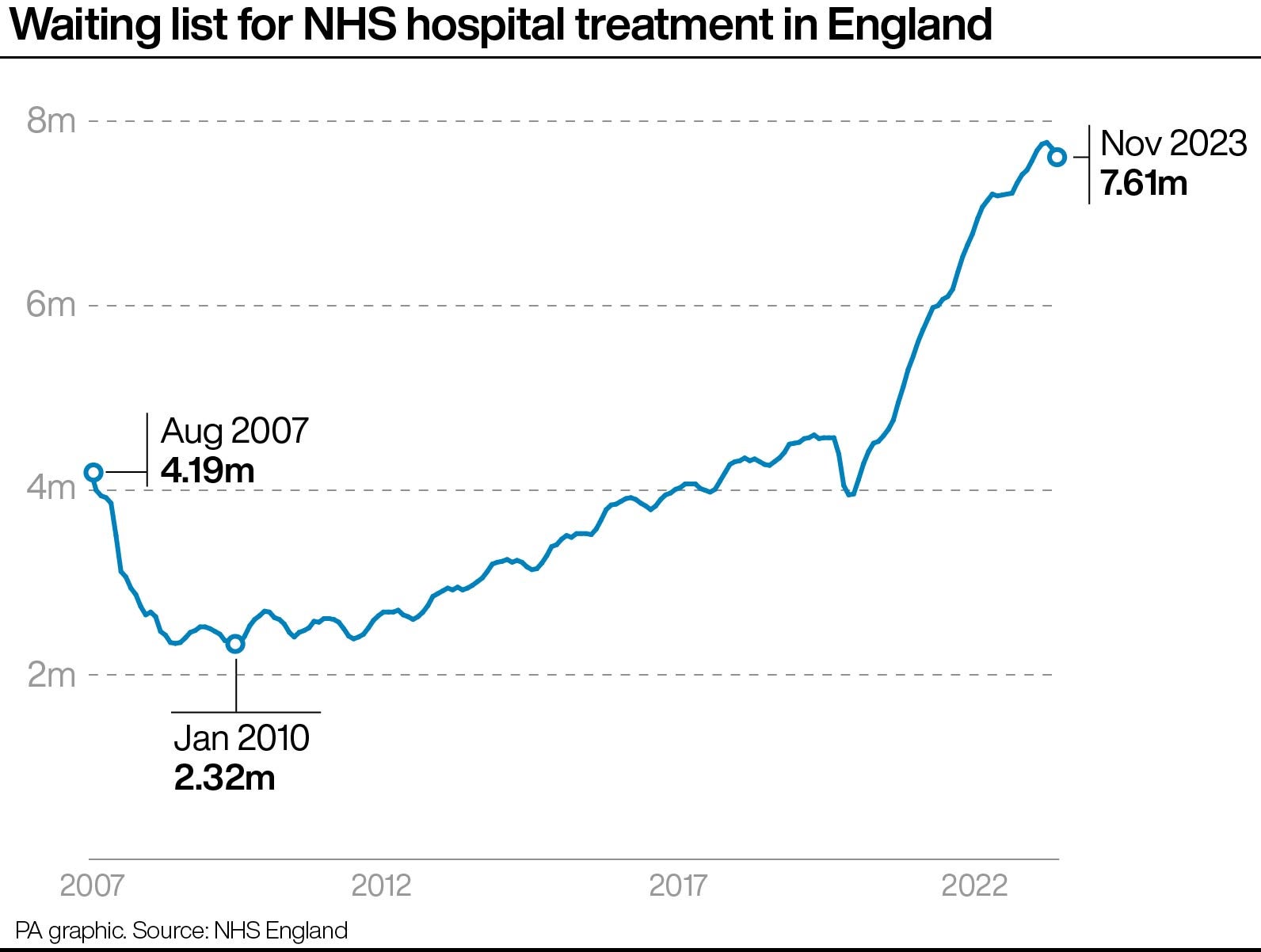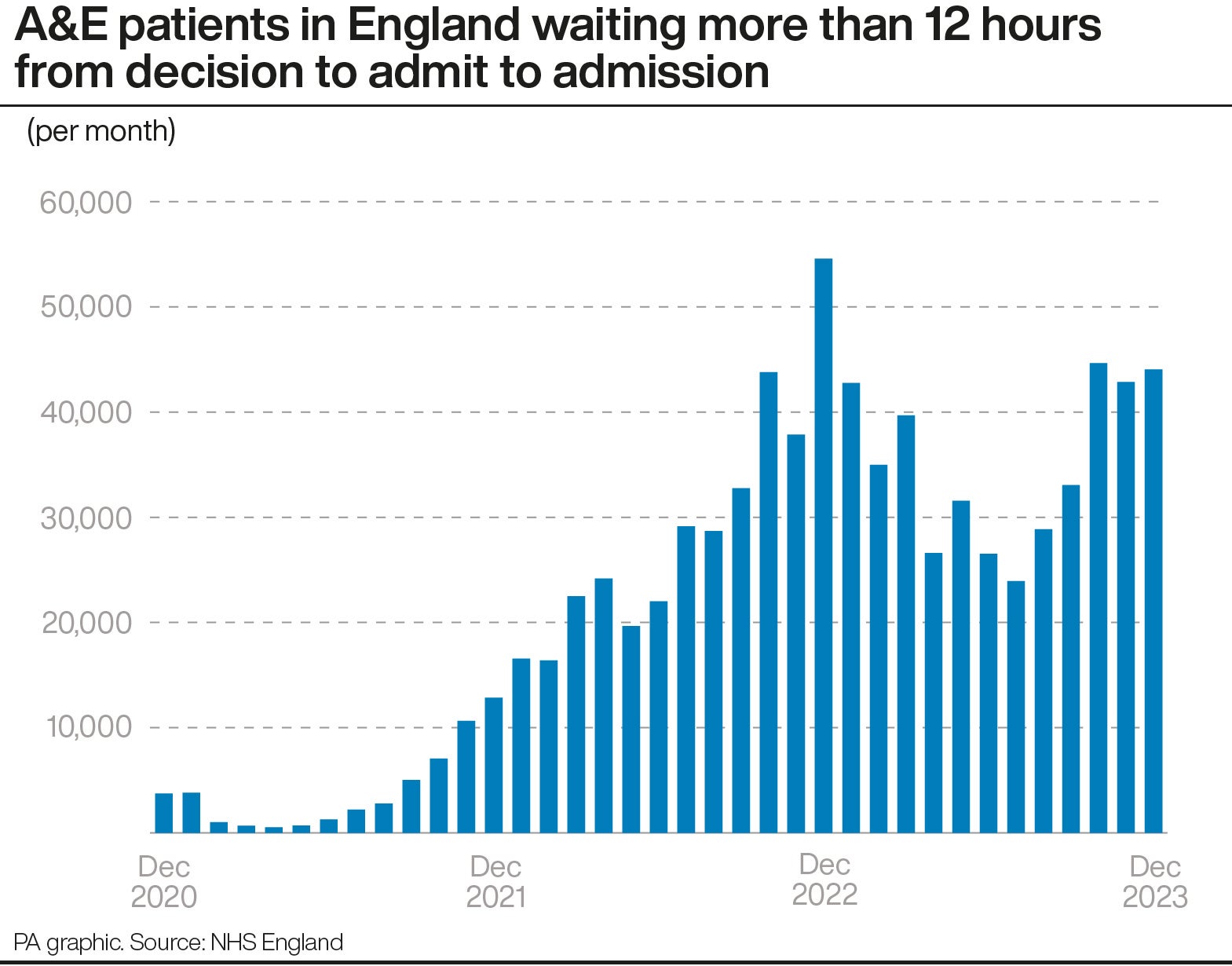NHS crisis by numbers: The stark new data that lays bare the scale of waiting list failings
Cancer targets are still being missed, data published by NHS England show
The NHS is failing to hit most of its key performance targets despite the overall waiting list dropping, new figures indicate.
The scale of the crisis the health service is facing has been laid bare, with NHS England data released on Thursday showing 7.61 million treatments waiting to be carried out as of November.
Some 11,168 people in England were waiting more than 18 months to start routine hospital treatment at the end of November, up from 10,506 at the end of October.
And cancer targets are still being missed, the data shows, with 71.9% of patients urgently referred for suspected cancer in November 2023 being diagnosed or having cancer ruled out within 28 days.
Below we look at what the new data means for patients, with the waiting list now even higher than when Rishi Sunak promised it would fall.
Overall waiting lists

In January 2023, the prime minister made cutting the waiting list a key priority for the year, saying “NHS waiting lists will fall and people will get the care they need more quickly”.
However, data published on Thursday showed that despite recent dips in the waiting list, it is still higher than when the pledge was made.
A&E
The number of people waiting more than four hours to be seen in A&E has gone up, from 146,272 in November to 148,282 in December last year.
In percentage terms, this equated to 69.4 per cent of patients in England being seen within four hours in A&Es in December, down from 69.7 per cent in November and against a target set for March this year of 76% per cent.

The record low of 65.2 per cent was recorded in December 2022.
The number of people waiting more than 12 hours in A&E departments in England from a decision to admit to actually being admitted was 44,045 in December, up from 42,854 in November, although still an improvement on last year.
Cancer treatment
Cancer targets were still being missed, the data showed, with 71.9 per cent of patients urgently referred for suspected cancer in November 2023 being diagnosed or having cancer ruled out within 28 days.
This was up from 71.1 per cent the previous month but below the target of 75 per cent.
In addition, the proportion of patients in England waiting longer than 62 days in November from an urgent suspected cancer referral or consultant upgrade to their first definitive treatment for cancer was 65.2 per cent.
This was up from 63.1 per cent in October but well below the 85 per cent target.
18-month waits
Some 11,168 people in England are estimated to have been waiting more than 18 months to start routine hospital treatment at the end of November 2023, up from 10,506 at the end of October.
The government and NHS England set the ambition of eliminating all waits of more than 18 months by April 2023, excluding exceptionally complex cases or patients who choose to wait longer.
NHS rules say that patient waiting times for non-urgent, consultant-led treatments should not exceed 18 weeks from the day the appointment was booked.
Analysis of the figures overall shows there would need to be a 400,000 drop in the December 2023 data (not yet published) to return the waiting list to what it was when the pledge was made. This is four times the drop made between October and November (100,000).
December’s data is also expected to be affected by the three-day junior doctor strike which saw 86,329 appointments put on hold and needing to be rescheduled. Flu and Covid hospital admissions are also likely to have added to NHS pressures.
To date, across all strikes from Dec 2022 to Jan 2024, some 1.3m operations or appointments have had to be cancelled and rescheduled.
Kate Seymour, head of advocacy at Macmillan Cancer Support, said: “Even though today’s data shows a slight improvement in waiting times, there are still thousands of people in England facing agonising delays for vital cancer diagnosis and treatment and what’s worse, this isn’t a new problem, we’ve been seeing it for years.
“Every day at Macmillan we hear how these unacceptable delays can cause needless anxiety and even result in a worse prognosis. People’s lives are being put at risk and it’s simply not good enough.”
The government said progress was being made tackling waiting lists but hit out at striking doctors, who recently completed the longest walkout in NHS history.
Health and Social Care Secretary Victoria Atkins said: “November was the first month without industrial action for over a year and we reduced the total waiting list by more than 95,000 – the biggest decrease since December 2010, outside of the pandemic.
“This shows the progress our fantastic NHS staff can make towards bringing waiting lists down when they don’t have to contend with industrial action.
“We want to put an end to damaging strikes once and for all, and if the BMA Junior Doctors Committee can demonstrate they have reasonable expectations, I will still sit down with them.”
Join our commenting forum
Join thought-provoking conversations, follow other Independent readers and see their replies
Comments
Bookmark popover
Removed from bookmarks